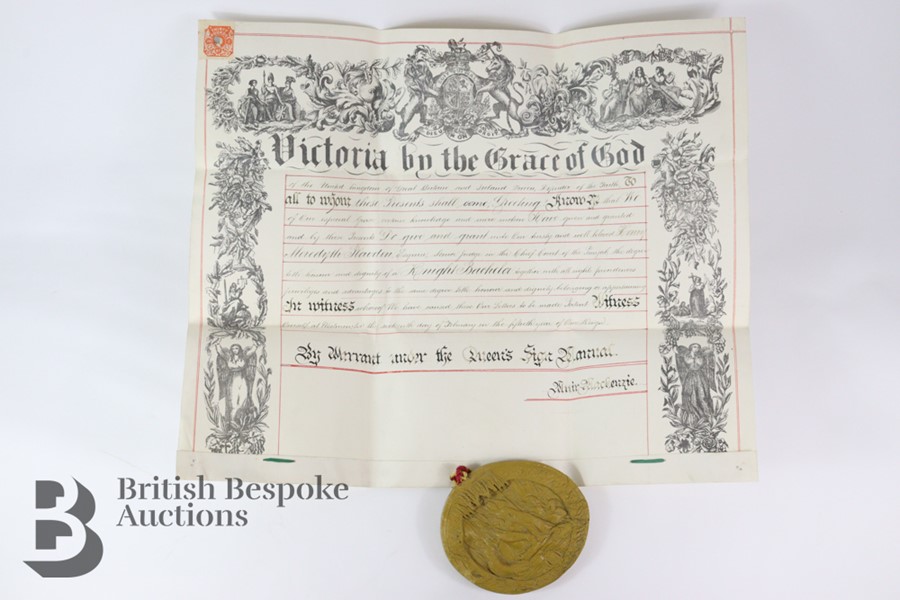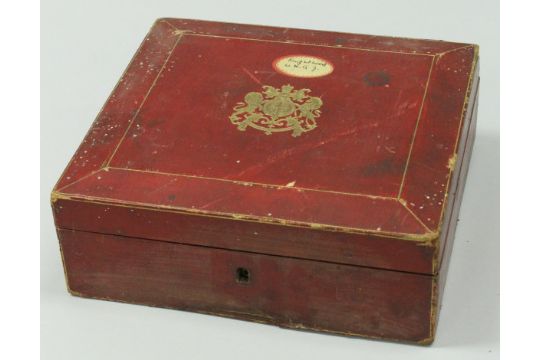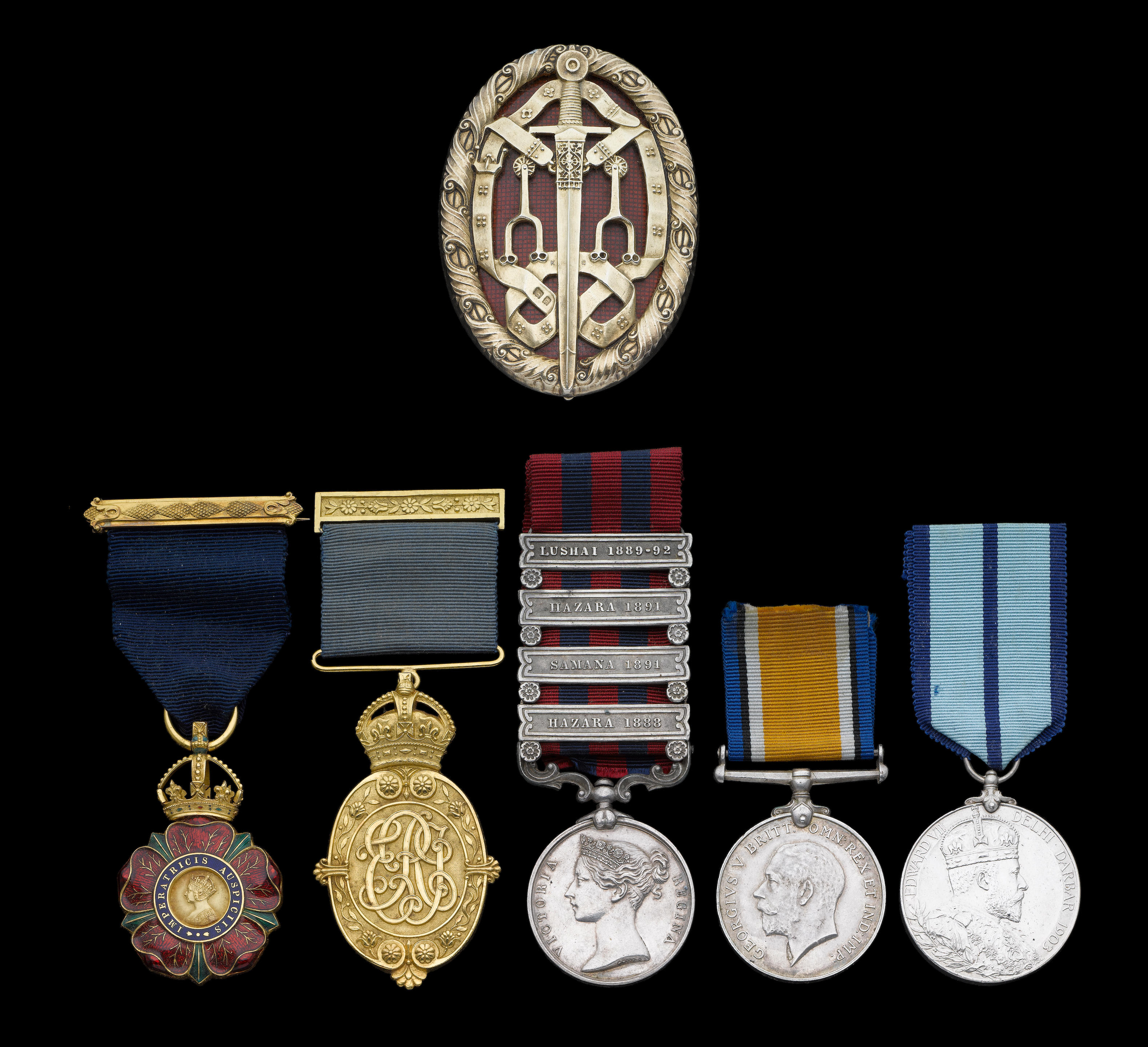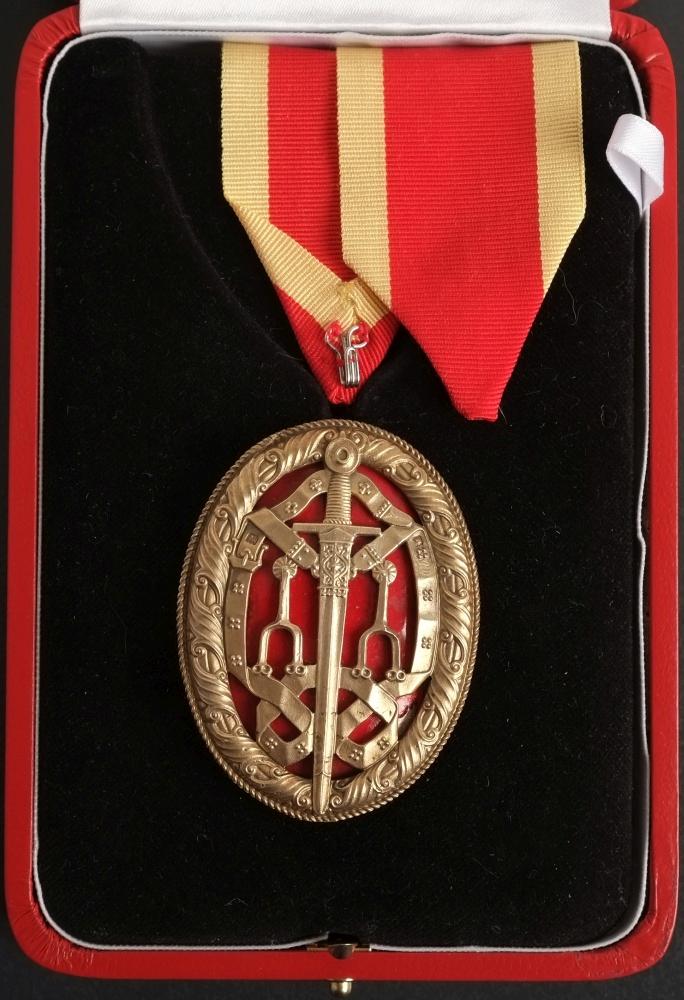A Knight Bachelor, C.B.E. group of five awarded to Sir William B. Griffiths, a well respected Colonial Judge and Deputy Governor of the Gold Coast, who ‘caught a spy and crushed a cult’ during his illustrious career in the Colonies and with the Special Constabulary during the Great War Knight Bachelor’s Badge, 1st type breast badge, silver-gilt and enamel, hallmarks for London 1926; The Most Excellent Order of the British Empire, C.B.E. (Civil) Commander’s 1st type, neck badge, silver-gilt and enamel ; Jubilee 1935; Coronation 1937; Special Constabulary Long Service Medal, G.V.R., 1st issue, 1 clasp, The Great War 1914-18 (Sir William B. Griffiths) medals mounted for wear, generally good very fine (5) £800-£1,200 Footnote C.B.E. London Gazette 30 March 1920: Legal Adviser to the Ministry of Pensions. William Brandford Griffith was born at Stone Court, Stone, Gloucestershire in February 1858. He was the son of Sir William B. Griffith, K.C.M.G., Governor of the Gold Coast. Griffith was educated at Oxenford House, Jersey and at Harrison College, Barbados. He studied as a West Indian Gilchrist Scholar at University College London, and was called to the Bar, Middle Temple, in 1881. Griffith was employed as Acting Queen’s Advocate, Gold Coast Colony in 1884, and as District Commissioner from the following year. He moved to Jamaica, and was appointed Resident Magistrate, and acted as Attorney General in 1893. Two years later Griffiths returned to the Gold Coast, and was appointed Chief Justice, serving as Deputy Governor, August - November 1897 (created a Knight Bachelor in 1898). Griffith was appointed President of the Special Court for the trial of the “Human Leopard” cases in Sierra Leone in 1912: ‘In 1912 he assisted to crush the “Human Leopards” of Sierra Leone, a native society which eat parts of the human body in the belief that this practice kept them young. To reach them, he trekked for weeks in the bush, and during his journey was badly bitten by ants. He presided over the trial of members of the cult at a special court, and a number of the ringleaders were afterwards hanged.’ (Obituary refers) Griffiths returned to the UK for the Great War, and served as a Special Constable with ‘D’ Division, with Headquarters being at Marylebone Lane Police Station: ‘Sir William served as a special constable in the early days of the War, and arrested a spy at Lambeth Bridge. He became legal adviser to the Ministry of Pensions in 1918.’ (Ibid) Having reached the rank of Staff Sergeant, Griffiths then joined the Inns of Court Volunteers as a Private. It was in fact whilst serving with the latter that Griffiths had apprehended a spy: ‘Once, when we were guarding Grosvenor Bridge [sic], I was on duty alone at the further end of the Bridge. Seeing a man under the Bridge. I duly challenged him. He answered me in a most unsatisfactory way, so I arrested him and marched him to headquarters at the other end of the Bridge. He said he was a Norwegian sailor, and that he had lost his way. There had been a good many unexplained fires in that neighbourhood, so we hauled him before the Police. He was charged with some sort of offence, and I had to appear before the Magistrate at Westminster. The newspapers described him as a Russian subject and stated that he was near an aeroplane factory; the former was not correct, but the latter was, and he got three months’ hard labour with a recommendation for deportation. I was most distinguished as being the only member of the Unit to capture a prisoner!’ (The Far Horizon, Portrait of a Colonial Judge refers) Griffith resided at 48 Tavistock Square, London, and died at 11 Beaumont Street, London in January 1939. His collated diaries were published under the title The Far Horizon, Portrait of a Colonial Judge. Sold with: a letter from the recipient addressed to K. B. Murray Esq., Secretary, The London Chambers of Commerce, dated 17 September 1884, regretfully declining the invitation to a Special General Meeting a
A Knight Bachelor, C.B.E. group of five awarded to Sir William B. Griffiths, a well respected Colonial Judge and Deputy Governor of the Gold Coast, who ‘caught a spy and crushed a cult’ during his illustrious career in the Colonies and with the Special Constabulary during the Great War Knight Bachelor’s Badge, 1st type breast badge, silver-gilt and enamel, hallmarks for London 1926; The Most Excellent Order of the British Empire, C.B.E. (Civil) Commander’s 1st type, neck badge, silver-gilt and enamel ; Jubilee 1935; Coronation 1937; Special Constabulary Long Service Medal, G.V.R., 1st issue, 1 clasp, The Great War 1914-18 (Sir William B. Griffiths) medals mounted for wear, generally good very fine (5) £800-£1,200 Footnote C.B.E. London Gazette 30 March 1920: Legal Adviser to the Ministry of Pensions. William Brandford Griffith was born at Stone Court, Stone, Gloucestershire in February 1858. He was the son of Sir William B. Griffith, K.C.M.G., Governor of the Gold Coast. Griffith was educated at Oxenford House, Jersey and at Harrison College, Barbados. He studied as a West Indian Gilchrist Scholar at University College London, and was called to the Bar, Middle Temple, in 1881. Griffith was employed as Acting Queen’s Advocate, Gold Coast Colony in 1884, and as District Commissioner from the following year. He moved to Jamaica, and was appointed Resident Magistrate, and acted as Attorney General in 1893. Two years later Griffiths returned to the Gold Coast, and was appointed Chief Justice, serving as Deputy Governor, August - November 1897 (created a Knight Bachelor in 1898). Griffith was appointed President of the Special Court for the trial of the “Human Leopard” cases in Sierra Leone in 1912: ‘In 1912 he assisted to crush the “Human Leopards” of Sierra Leone, a native society which eat parts of the human body in the belief that this practice kept them young. To reach them, he trekked for weeks in the bush, and during his journey was badly bitten by ants. He presided over the trial of members of the cult at a special court, and a number of the ringleaders were afterwards hanged.’ (Obituary refers) Griffiths returned to the UK for the Great War, and served as a Special Constable with ‘D’ Division, with Headquarters being at Marylebone Lane Police Station: ‘Sir William served as a special constable in the early days of the War, and arrested a spy at Lambeth Bridge. He became legal adviser to the Ministry of Pensions in 1918.’ (Ibid) Having reached the rank of Staff Sergeant, Griffiths then joined the Inns of Court Volunteers as a Private. It was in fact whilst serving with the latter that Griffiths had apprehended a spy: ‘Once, when we were guarding Grosvenor Bridge [sic], I was on duty alone at the further end of the Bridge. Seeing a man under the Bridge. I duly challenged him. He answered me in a most unsatisfactory way, so I arrested him and marched him to headquarters at the other end of the Bridge. He said he was a Norwegian sailor, and that he had lost his way. There had been a good many unexplained fires in that neighbourhood, so we hauled him before the Police. He was charged with some sort of offence, and I had to appear before the Magistrate at Westminster. The newspapers described him as a Russian subject and stated that he was near an aeroplane factory; the former was not correct, but the latter was, and he got three months’ hard labour with a recommendation for deportation. I was most distinguished as being the only member of the Unit to capture a prisoner!’ (The Far Horizon, Portrait of a Colonial Judge refers) Griffith resided at 48 Tavistock Square, London, and died at 11 Beaumont Street, London in January 1939. His collated diaries were published under the title The Far Horizon, Portrait of a Colonial Judge. Sold with: a letter from the recipient addressed to K. B. Murray Esq., Secretary, The London Chambers of Commerce, dated 17 September 1884, regretfully declining the invitation to a Special General Meeting a














/85380/Internet%20Image%201.jpg)
Try LotSearch and its premium features for 7 days - without any costs!
Be notified automatically about new items in upcoming auctions.
Create an alert